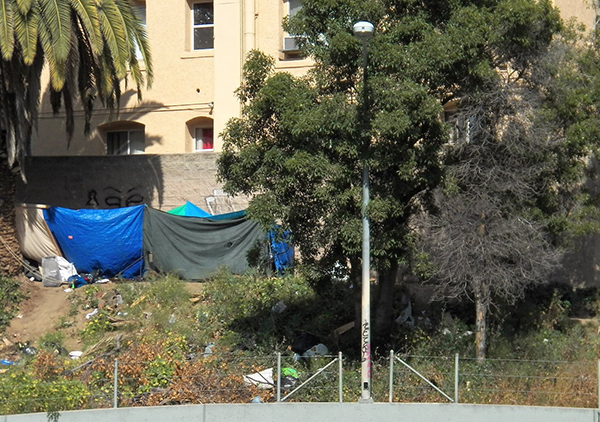By Juliet Bennett Rylah
Contributing Writer
HOLLYWOOD — The Hollywood Studio District Neighborhood Council has gone on record in opposition to a Los Angeles City Council “anti-camping” motion that many detractors say would criminalize homelessness.
In a 13-1 vote with one abstention Nov. 9, the Neighborhood Council signed off on a community impact statement opposing a draft ordinance that would ban sitting, sleeping and lying within 500 feet of freeways or public transport infrastructure and shelter.
Council members expressed concern that the proposed motion would be ineffective in addressing the root causes of homelessness, while acknowledging issues with encampments, including inaccessible sidewalks and an increase in garbage in the streets.
“I think we try to be understanding and empathize with community members who are not homeless but who are affected by [homelessness] while at the same time, I think it’s incumbent upon us to advocate for changes that effectively address root issues,” said John Franklin Sierra, a senior staff analyst with the county Department of Mental Health and one of the chairs of the neighborhood council.
The Hollywood Studio District Neighborhood Council is one of several councils to oppose the motion, introduced in late October by City Councilman Bob Blumenfield.
Blumenfield’s motion would instruct the city attorney to change Los Angeles Municipal Codes 41.18 and 56.11, which ban sitting, sleeping and lying in public areas and storing belongings there, respectively. The city doesn’t enforce the ordinances, because of a ruling by the Ninth Circuit Court of Appeals, which decided in Martin v. City of Boise that it’s unconstitutional for cities to enforce laws against sleeping outside if shelter isn’t available.
Cities can, however, block camping in certain areas at certain times. Blumenfield’s motion would ban sitting, sleeping, and lying down within 500 feet of freeways, ramps, underpasses, tunnels and homeless services facilities that opened after Jan. 1, 2018, if shelter has been offered. The latter would ban storing property in any of those same places.
The basis for this motion dates back to March, when the public advocacy group L.A. Alliance sued the city and county of Los Angeles, saying the agencies had not done enough to serve and shelter people experiencing homelessness, resulting in unhealthy conditions on city streets for both the unhoused and housed alike.
U.S. District Judge David O. Carter, who is overseeing the case, ordered the city to provide shelter for people who currently camp near freeway underpasses and ramps. In June, the Los Angeles Times reported on a city and county agreement to provide an additional 6,000 beds, per Carter’s order.
The original motion drew controversy, both via written comment and during the Oct. 28 City Council meeting. Supporters complain of encampments in their own neighborhoods that they say have created unsafe, unsanitary conditions for both the unhoused and anyone who navigates through and around them, particularly those with disabilities or who use a wheelchair. Opponents say the new laws would only criminalize homelessness, and that the city should invest in housing and wrap-around services.
The Los Angeles Homeless Services Authority’s 2020 Greater Homeless Count tallied over 41,000 people experiencing homelessness in the city of Los Angeles, almost 30,000 of whom are unsheltered at any given time. The authority’s Housing Inventory Count found that the City of LA only has about 15,000 beds available.
Numerous neighborhood councils weighed in, with the Woodland Hills Warner Center Neighborhood Council and the Venice Neighborhood Council voting to support the motion, while the Silver Lake Neighborhood Council and the Palms Neighborhood Council among those voting to oppose.
Daniel Conway, a policy advisor for L.A. Alliance, the group behind the lawsuit against the city and county, said the group was surprised by the council’s motion and found the backlash it received a “very foreseeable reaction.” Though L.A. Alliance does not have a formal stance on the motion, Conway said he does appreciate that council members have since begun discussing other ideas around housing policies and data gathering.
“We want to see a comprehensive solution,” he said. “What we expect from this settlement is an agreement for tens of thousands of new beds … and then the comprehensive social services that need to come with it, [such as] mental health and substance abuse [services], helping people reunite with families, job training, whatever that may be. Not coming with a one-size-fits-all approach, but really trying to understand individuals and help them get back on a path to a good place in their lives.”
Juliet Bennett Rylah is a freelance reporter who covers Hollywood and West Hollywood. She can be reached at jbrylah@gmail.com.












